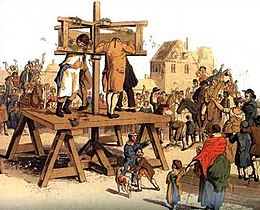Our website is made possible by displaying online advertisements to our visitors.
Please consider supporting us by disabling your ad blocker.
Humiliation
This article may be too technical for most readers to understand. (August 2022) |

| Part of a series on |
| Emotions |
|---|
  |
Humiliation is the abasement of pride, which creates mortification or leads to a state of being humbled or reduced to lowliness or submission. It is an emotion felt by a person whose social status, either by force or willingly, has just decreased.[1] It can be brought about through intimidation, physical or mental mistreatment or trickery, or by embarrassment if a person is revealed to have committed a socially or legally unacceptable act. Whereas humility can be sought alone as a means to de-emphasize the ego, humiliation must involve other person(s), though not necessarily directly or willingly.
Humiliation is currently an active research topic, and is now seen as an important – and complex – core dynamic in human relationships, having implications at intrapersonal, interpersonal, institutional and international levels.[2][3]
- ^ Burton, Neel. "The Psychology of Humiliation". Archived 21 February 2023 at the Wayback Machine. Psychology Today. 27 August 2014. 10 October 2016.
- ^ Lindner, Evelin, Making Enemies: Humiliation and International Conflict. London, England: Praeger Security International, 2006.
- ^ General Assembly, Presbyterian Board of Publications, 1886 (1886). William Eves, Moore (ed.). "The Presbyterian Digest of 1886: A Compend of the Acts, and Deliverances of the General Assembly of the Presbyterian Church in the United States of America". Presbyterianism. Presbyterian Board of Publications, 1886: 238.
{{cite journal}}: CS1 maint: multiple names: authors list (link) CS1 maint: numeric names: authors list (link)
Previous Page Next Page


